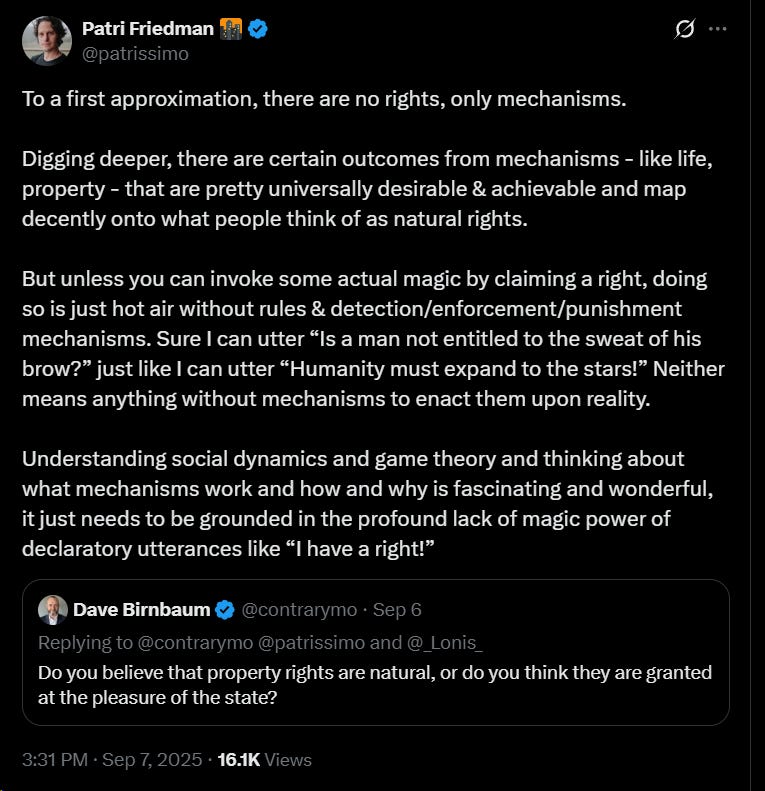The Fire and the Anvil
On the forging of rights beyond Patri Friedman’s mechanisms
The Friedman Claim
Patri Friedman, grandson of Milton and son of David, has offered a characteristically hard-nosed reduction: "To a first approximation, there are no rights, only mechanisms." In his view, what we call rights are not metaphysical absolutes but outcomes of systems—rules, enforcement, detection, and punishment—that make certain outcomes (life, property, liberty) reliably achievable. Declaring a right without mechanisms is as empty as declaring "humanity must expand to the stars!" —words without machinery to translate them into reality.
This is the lineage of economic realism carried through the Friedman line: a relentless focus on incentives, enforcement, and rules. Patri’s point is clear: rights without mechanisms are fantasies.
The Axio View: Rights Are Forged
At Axio, we agree with the spirit but reject the incompleteness. Rights are not mystical entities floating in a Platonic ether. They are forged—claimed, defended, and enforced by agents willing to back them with coercion, and accepted as ethical by others. Rights are not “natural,” nor “granted by the state.” They are preferences backed by force, hardened into durable norms when society judges that enforcement legitimate.
Where Patri speaks of “mechanisms,” we speak of agency. Mechanisms are simply the institutionalized expressions of many individual acts of agency: threats honored, defenses mounted, bargains struck, punishments delivered. To reduce rights only to mechanisms risks mistaking the machine for the machinist.
Mechanisms vs. Agency
Patri’s mechanism-centric lens is valuable for understanding how rights persist, but it ignores the prior fact that someone must choose to assert and defend them. Without agency, there are no mechanisms at all. Rights are not discovered; they are willed into existence. They exist only where agents are prepared to use coercion and where others deem that coercion justified.
This distinction matters. If we equate rights with mechanisms alone, we risk endorsing any mechanism that happens to exist. Slavery, apartheid, and tyranny were all well-mechanized. Were those rights? Of course not. Without an ethical standard grounded in agency, “mechanisms” can legitimize oppression just as easily as liberty.
The Ethical Filter
The Axio framework insists that coercion is unavoidable but must be judged. A right is not simply “whatever the system enforces.” A right is a claim defended by coercion that survives the test of ethical recognition. Without the ethical filter, rights collapse into brute power. With it, rights become a crucible of contested preferences, stabilized only when enough agents consent to their legitimacy.
This is what we mean when we say rights are forged: they emerge from the clash of agency, stabilized by enforcement, and sanctified (or rejected) by collective judgment. The forging metaphor highlights both violence and creativity, both coercion and legitimacy.
Declaratory Power and Coordination
Patri is correct to mock the empty phrase “I have a right!” when unbacked by enforcement. But he overlooks the coordinating power of such declarations. Rights-talk often precedes enforcement. It is how agents rally allies, shape norms, and build the consensus that hardens into mechanisms. The U.S. Declaration of Independence was just ink on parchment until agents chose to die for it. Words alone may be powerless, but words backed by agency can change the world.
Conclusion: Beyond Mechanisms
Patri Friedman strips rights of metaphysical pretension and grounds them in mechanisms. That is progress. But it is not enough. The deeper truth is that rights are forged: they are born in agency, tempered by coercion, and legitimized through ethical recognition. Mechanisms are necessary, but they are the tools of the forge, not the forge itself.
To reduce rights to mechanisms is to describe the finished product without the smith’s hammer. To see rights as forged is to understand the fire, the hammer, and the will that shapes them.
Rights without mechanisms are toothless. But mechanisms without agency are blind.



